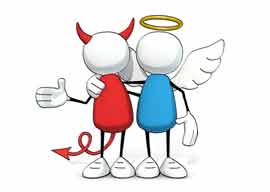
February 13, 2016

Source: Shutterstock
Having, like most journalists, made a career of lamenting the state of the world, I find that I am easily subject to feelings of guilt. To read the corpus of my work you might easily suppose that we lived in a world in which it was impossible to be happy. Yet when I look back, not only I but most people by whom I am surrounded have lived happy, if not always ecstatic, lives.
Observing the misfortunes of others induces feelings of guilt because I no more deserve my good fortune than they (in many cases) deserve their bad. I find William Blake’s famous lines
Every night and every morn
Some to misery are born.
Every morn and every night
Some are born to sweet delight
neither uplifting nor consolatory, however accurate they may be as a description of the human predicament, and however fine as lines of poetry.
This morning I went into one of those shops that sell donated goods supposedly to raise money for a charity. This particular charity, one of the largest in the world, I regard as a criminal organization, in the moral if not the legal sense. I patronize the shop not to support the charity”heaven forbid, very little of the money raised goes in any case to genuinely charitable activity, one of the reasons I regard the organization as criminal”but to find discarded books of unappreciated value. Quite often I succeed.
The only service the shop really performs is to give employment (unpaid, of course) to the widows who work in it as volunteers under the misapprehension that they are thereby assisting the starving of the world. A glance at the online accounts of the organization would soon disabuse them of this misapprehension, but luckily for the charity few people read their accounts. Not everyone avails himself of the available.
One of the volunteers in the shop this morning was a man of such peculiar appearance that I felt a compulsion both to look at and to avert my eyes from him. He was very fat and appeared hypogonadal; of course, these days obesity is nothing unusual. But his face was so very odd”eyes far apart, perfectly round; teeth widely separated”that I thought he must suffer from, or be an instance of, a specific syndrome that as a doctor I should have recognized at once but did not (another cause of guilt). His manner was smiling and pleasant but also strange, as if he were speaking underwater; when it came to serving customers, he seemed not to be allowed by the other staff to do very much. I felt slightly warmer toward the charity for taking him, even if it otherwise did little to help the hungry as it was supposed to do.
I departed the shop with my accustomed feeling in these circumstances of guilt, not that I had done anything wrong in this instance, but that I habitually failed to count my blessings. You couldn”t help but feel a fathomless sorrow for this man, though in fact he said or did nothing to indicate discontent, let alone unhappiness. No doubt there were many people more fortunately endowed by nature and circumstance than he who were far less happy, and it is with unhappiness that we commiserate even when, to a degree, it is self-inflicted (as it usually is these days). But still our compassion is aroused more powerfully by a man such as he than by the unhappy fortunate. However content or happy we found him, we should neither envy nor wish to exchange places with him.
Of course, the salutary effect of such an experience as mine in the shop does not last long; it evaporates within the space of a hundred yards. Just let the bus be late or a shoelace come undone and you are back to pitying yourself and counting your curses.